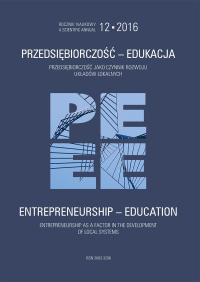The Effectiveness of Educational Programs in Entrepreneurship, Based on a Case Study of the Warsaw University of Technology – Statement of the Research
DOI:
https://doi.org/10.24917/20833296.12.27Keywords:
education, effectiveness, entrepreneurship, higher education, questionnaire, verificationAbstract
For about a decade more and more initiatives of teaching entrepreneurship are held in Poland, including universities courses (within technical ones as well). In the subject literature, teaching entrepreneurship is a well-recognized topic, especially when it comes to creating a syllabus. Nevertheless, there is a knowledge gap in the effectiveness of such entrepreneurship courses and conducting a study in this area appears to be challenging due to methodological obstacles. The main goal of the study that is discussed in this article is creating and testing a survey which enables verifying the education programs in terms of entrepreneurship. It will be a base for conducting a long-term comparison study in the area of entrepreneurship in education. The examined topics are: educational programs, methods of implementation and entrepreneurship approaches demonstrated by students. The copyrighted program discussed in this paper takes place in the Warsaw University of Technology since 2007. Currently, there are actions to evaluate the influence of the program on careers of the University’s graduates. The data source was built on the results of two pilot surveys conducted on the course participants (students). The results allowed for determining a primary structure of the main study, the tone of questions and suggested answers. Currently, the survey is divided into four parts: course evaluation, exploring the will and attitude to self-employment, examining the opportunities and threats of owning a company and defining family determinants. It is certain that there is still a difficulty to capture the effects of education in undertaking ambitious and high-growing ventures. Further research and studies will focus on this aspect.References
Ajzen, I. (1991). The theory of planned behavior. Organizational behavior and human decision processes, 50(2), 179–211.
Ajzen, I. (2002). Constructing a TPB questionnaire: Conceptual and methodological considerations. Pozyskano z: http://chuang.epage.au.edu.tw/ezfiles/168/1168/attach/20/pta_41176_7688352_57138.pdf
Ajzen, I. (2005). Attitudes, personality, and behavior. McGraw-Hill Education (UK).
Blank, S. (2013). Why the lean start-up changes everything. Harvard Business Review, 91(5), 63–72.
Blank, S., Dorf, B. (2012). The startup owner’s manual. K&S; Ranch.
Charney, A., Libecap, G. D. (2000). Impact of entrepreneurship education. Kansas City, MO: Kauffman Center for Entrepreneurial Leadership.
Cieślik, J. (2008). Kształcenie w zakresie przedsiębiorczości na poziomie akademickim. Pozyskano z: http://www.fundacja.edu.pl/przedsiebiorczosc/_referaty/sesja_IIa/5.pdf
Cieślik, J. (2014a). Iluzje innowacyjnej przedsiębiorczości. Kwartalnik Nauk o Przedsiębiorstwie, 3, 4–16.
Cieślik, J. (2014b). Przedsiębiorczość, polityka, rozwój. Wydawnictwo Akademickie SEDNO, Warszawa.
Cieślik, J., Guliński J., Matusiak K., Skala-Poźniak A. (2011). Edukacja dla przedsiębiorczości akademickiej. Polska Agencja Rozwoju Przedsiębiorczości.
Cohen, L., Manion, L., Morrison, K. (2010). A guide to teaching practice. Routledge.
Enfield, J. (2013). Looking at the impact of the flipped classroom model of instruction on undergraduate multimedia students at CSUN. TechTrends, 57(6), 14–27.
Fairlie, R., Robb, A. (2007). Families, Human Capital, and Small Business: Evidence from the Characteristics of Business Owners Survey. Industrial and Labor Relations Review, 60(2), 225–245.
Fayolle, A., Lassas-Clerc, N. (2006, September). Essay on the nature of entrepreneurship education. In International Conference Entrepreneurship in United Europe-Challenges and Opportunities.
Feliniak, U. (2007). Przygotowanie absolwentow szkoł do kariery zawodowej. Acta Universitatis Lodziensis. Folia Oeconomica, 210, 85–106.
Gabała, J. (2005). Kształtowanie postaw przedsiębiorczych uczniów. Przedsiębiorczość – Edukacja, 1, 145–152.
Gaweł, A., Pietrzykowski, M. (2015). Edukacja przedsiębiorczości w postrzeganiu przedsiębiorczości i kształtowaniu intencji przedsiębiorczych. Problemy Zarządzania, 13, 1(51), t. 2. 41–55.
Gibb, A.A. (1993). Enterprise culture and education understanding enterprise education and its links with small business, entrepreneurship and wider educational goals. International small business journal, 11(3), 11–34.
Guzman, J., Linan, F. (2005; 2015, 10 maja). Perspectives On Entrepreneurial Education: A Us-Europe Comparison. Jean Monnet European Studies Centre Universidad Antonio de Nebrija. Pozyskano z: http://www.nebrija.com/jeanmonnet/pdf/guzman-linian.pdf
Henrekson, M., Sanandaji, T. (2014). Small business activity does not measure entrepreneurship. Proceedings of the National Academy of Sciences, 111(5), 1760–1765.
Herreid, C. F., Schiller, N.A. (2013). Case studies and the flipped classroom. Journal of College Science Teaching, 42(5), 6–66.
Jeruszka. U. (red.) (2001). Metody badania losow i karier absolwentow szkol zawodowych. Warszawa: IPiSS.
Jeruszka. U. (2006). Metody badania jakości kształcenia w szkołach wyższych. Polityka Społeczna, 8.
Jeruszka. U. (2011). Efektywność kształcenia w szkołach wyższych. Polityka Społeczna, 1.
Kuckertz, A, (2013). Entrepreneurship Education – Status Quo and Prospective Developments. Journal of Entrepreneurship Education, 16. 59–71. Pozyskano z: http://ssrn.com/abstract=1862295; http:// dx.doi.org/10.2139/ssrn.1862295
Kuckertz, A. (2013; 2015, 10 maja). What’s Hot in Entrepreneurship Research in 2013? The 1st of a Series of Annual Trend Surveys. Universitat Hohenheim, Hohenheim, Niemcy. Pozyskano z: https://entrepreneurship.uni-hohenheim.de/uploads/media/What_s_hot_in_Entrepreneurship_ Research_2013_03.pdf
Kuratko, D.F. (2005). The emergence of entrepreneurship education: Development, trends, and challenges. Entrepreneurship theory and practice, 29(5), 577–598.
Linan, F. (2007). The role of entrepreneurship education in the entrepreneurial process. Handbook of Research in Entrepreneurship Education, 230.
Marszałek, A. (2012). Analiza postaw przedsiębiorczych wśrod studentow. E-mentor, 3(45), 25–34.
Osterwalder, A., Pigneur, Y. (2010). Business model generation: a handbook for visionaries, game changers, and challengers. John Wiley & Sons.
Pirog, D. (2014). Uwarunkowania przedsiębiorczości absolwentów szkół wyższych: założenia teoretyczne i stan rzeczywisty. Przedsiębiorczość – Edukacja, 10, 306–315.
Pirog, D. (2015) Kompetencje z zakresu przedsiębiorczości: rozważania teoretyczne i ich ilustracje w obszarze szkolnictwa wyższego. Przedsiębiorczość – Edukacja, 11, 364–376.
Reis, E. (2011). The Lean Startup. New York: Crown Business.
Richert-Kaźmierska, A. (2011). Przedsiębiorczość jako przedmiot nauczania na wyższej uczelni – wyzwania merytoryczne i metodyczne. E-mentor, 2, 39.
Rubacha, K. (2013). Standardy badań społecznych. Problematyzowanie praktyki edukacyjnej. Przegląd Badań Edukacyjnych, 1(16), 43–51.
Skala, A. (2015). Przedsiębiorczość – wyzwanie dla edukacji. W: Pustuła, A., Majczyk, J., Darecki, M. (red). Przedsiębiorczość: jednostka, organizacja, kontekst. Warszawa: Wydawnictwo Naukowe Wydziału Zarządzania Uniwersytetu Warszawskiego, 7–27.
Strykowski, W. (1997). Problematyka badawcza technologii kształcenia. Neodidagmata XXIII, 31-41.
Wach, K. (2013). Edukacja na rzecz przedsiębiorczości wobec współczesnych wyzwań cywilizacyjno-gospodarczych. Przedsiębiorczość – Edukacja, 9, 246–257.
Zioło, Z. (2012). Miejsce przedsiębiorczości w edukacji. Przedsiębiorczość – Edukacja, 8, 10–23.
Downloads
Published
How to Cite
Issue
Section
License
Articles are published under the terms of the Creative Commons License (CC BY-ND 4.0; Attribution– NoDerivs).

